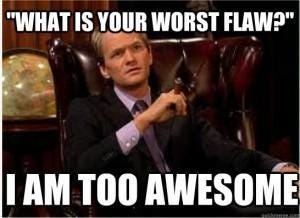In a Job Interview, This Is How to Acknowledge Your Weaknesses
One day, a young woman named Michele Hansen spotted a job opening that piqued her interest. She wasn’t qualified—the posting was for a product manager at an investment company, and she had no experience in financial services.
In that situation, the voice in your head screams for self-promotion. When you have to address your weaknesses in a cover letter or an interview, it’s only natural to channel your inner Michael Scott: “I work too hard. I care too much.”
But Michele Hansen did the exact opposite. She went into George Costanza mode (“I'm unemployed and I live with my parents”). Instead of trying to hide her limitations, she led with them:
“I'm probably not the candidate you've been envisioning,” her cover letter began. “I don't have a decade of experience as a Product Manager nor am I a Certified Financial Planner.”
Hansen got the job. And she isn’t alone. Although many people believe self-promotion is the ticket to landing a coveted job, the evidence shows otherwise. In one study, interviewers gave the highest ratings to business school applicants who were more concerned with being seen accurately than positively. In another, undergraduates who played up their skills and accomplishments were not significantly more likely to get job offers. And executives who tried to impress board members with their qualifications did not succeed in landing more board seats.
In a pair of experiments, Alison Fragale and I found that self-promotion only paid off when the audience was distracted enough to remember the information but forget the source. Otherwise, they saw right through it. If you were that great, you wouldn’t need to boast about your greatness.
Of course, you can’t get a job if you only focus on your inadequacies. After confessing her lack of relevant experience, Michele Hansen devoted the rest of her cover letter to explaining why she had the motivation and skills to succeed anyway. “I don't wait for people to tell me what to do and go seek for myself what needs to be done,” she wrote. “I'm entrepreneurial, I get things done… I love breaking new ground and starting with a blank slate.”
Sadly, there’s evidence for a particular backlash against female self-promoters. Trumpeting accomplishments violates outdated gender stereotypes of women as communal and modest rather than assertive and ambitious. Michele Hansen avoided that backlash by discussing her deficiencies with confidence and humility. As a result, her comments about her strengths came across as more credible. By admitting her shortcomings, she made it clear that she was self-aware enough to see them—and secure enough to be open about them.
If you’re really determined to showcase your strengths, instead of feigning humility, it’s more effective to use humor. Across six studies, job applicants and founders were more successful when they joked about their capabilities. I have a proven track record of turning caffeine input into productivity output. Humor signals competence without arrogance.
In 1987, the Chicago Sun-Times had to replace their beloved advice columnist, Ann Landers. A young journalist, Jeff Zaslow, was writing an article about the search and decided to throw his hat in the ring. “How could you have the audacity to give advice?” an interviewer scoffed. “I may only be 28,” Zaslow replied, “but I have the wisdom of a 29-year old.”
They hired him.



I would love to read a similar article that demonstrates winning interview techniques for ages 50+.
I recently talked about how I was at work when I was depressed and how I overcame it and developed resilience to be more effective at work and better with people. I laid bare my shortcomings, and I was rewarded for it with a final interview. The hiring manager was very impressed when I told her that I had overcome depression; that answer helped me display my strengths better than bragging about my work accomplishments, which I did not expect. I’m about to do the final round, and hoping this approach pays off once again.